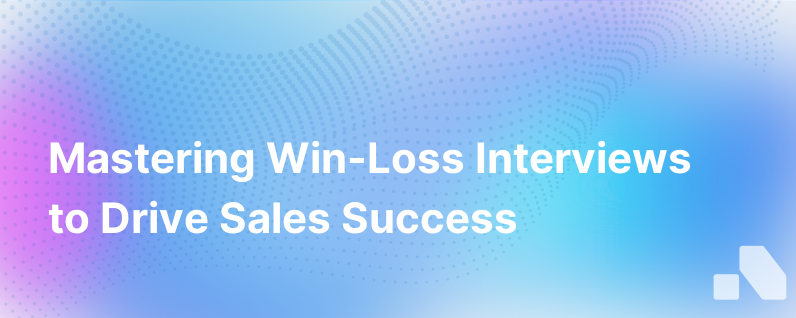Win Loss Interviews
Published on December 7, 2023 by Sawyer Middeleer
Understanding why you lose or win deals is critical in the highly competitive B2B sales landscape. One powerful strategy to access this game-changing information is through win-loss interviews – a tactical practice often overlooked in B2B startups and SMEs but can be the differentiator in achieving growth and retention goals.
In this expansive guide, we deep-dive into the concept of win-loss interviews – what they are, why they're important, how to conduct them, and the value they bring to your sales strategy.
Understanding Win-Loss Interviews
Win-loss interviews are strategic analyses of won or lost sales opportunities, ideally conducted with the decision maker in the customer’s buying center. These interviews provide invaluable insights into the buyer's decision-making process, as well as your company’s performance throughout the sales process.
Monitoring these factors only internally can lead to a one-sided perception of your sales efficiency. Raw, informative feedback from a client’s perspective offers the most reliable and accurate assessment of your sales process and strategy.
Importance of Win-Loss Interviews
The goal of win-loss interviews is to identify trending factors that are contributing to the success or failure of your sales. The reasons for lost deals can be numerous and may vary from problems with the product or price, misunderstanding of the customer's needs, misalignment with their business goals, or even a simple personal preference to work with a competitor.
Triggering growth is synonymous with leveraging successes and learning from failures. Understanding the nuances of your sales process that led to excitement or disappointment in the customer's journey equips you with data that can bolster your future sales strategies.
Conducting Win-Loss Interviews: The Process
1. Identify Interview Candidates: Prioritize recent deals which have reached a conclusion, regardless of the outcome. Aim for a healthy mix of both won and lost deals, covering different industries, product lines, or salespeople.
2. Request an Interview: Be tactful and friendly in your approach, expressing that you'd like to learn from their experience. It's essential to put the client at ease, ensuring them that they're providing a third-party perspective to help your company's continuous growth journey.
3. Design the Interview: Keep the conversation focused using a structured list of questions. Remember, the interview is about their buying process, decision-making criteria, and impressions of your sales process.
4. Conduct the Interview: Using a neutral interviewer, such as a third-party or a non-sales employee, is highly recommended. A neutral interviewer increases the chance of candid, constructive feedback.
5. Analyze and Share Results: The outcomes of these interviews should be systematically analyzed and shared. The goal here is to identify patterns over time that could hint at a systemic issue within your sales process or validate your techniques' effectiveness.
Essential Questions for Win-Loss Interviews
While the complexity of questions can vary based on particular sales, some universal questions apply to almost every scenario:
- What triggered the search for our solution?
- What was the final decision, and why was it made?
- Was our pricing competitive? If not, how relevant was pricing in your decision?
- How well did our product/solution meet your needs?
- What could we have done better in the sales process?
These questions help you understand the buyer's journey, decision influencers, pricing factors, solution assessment, and the client's impression of your sales process.
Leveraging Win-Loss Interviews for Growth
Once you gather intel from these interviews, it's time to turn them into strategies.
- Review & Enhance Sales Strategy: If a pattern of lost quotes because of price emerges, a pricing strategy review may be needed. Missing a crucial feature that clients consistently look for may drive product development change.
- Improve Sales Training: Training programs can be tailored based on the feedback from these interviews, focusing on enhancing skills where your sales team underperformed.
- Amplify Marketing Communications: Clients often highlight what they value the most in their buying process. Use this information to tweak your messaging.
Conclusion
Win-loss interviews are an invaluable tool to staying competitive in today's fast-paced, customer-centric B2B sales environment. They offer an objective view of your pricing, products, and sales techniques, providing actionable insights to fuel your growth strategy.
As discussed, the process of conducting win-loss interviews and analyzing them can be quite involved. Platforms like Aomni can streamline this process, providing real-time insights and a comprehensive view of your sales cycle. Leveraging this kind of AI-powered solutions can help you turn hard-earned knowledge from loss-interviews into a winning sales strategy.